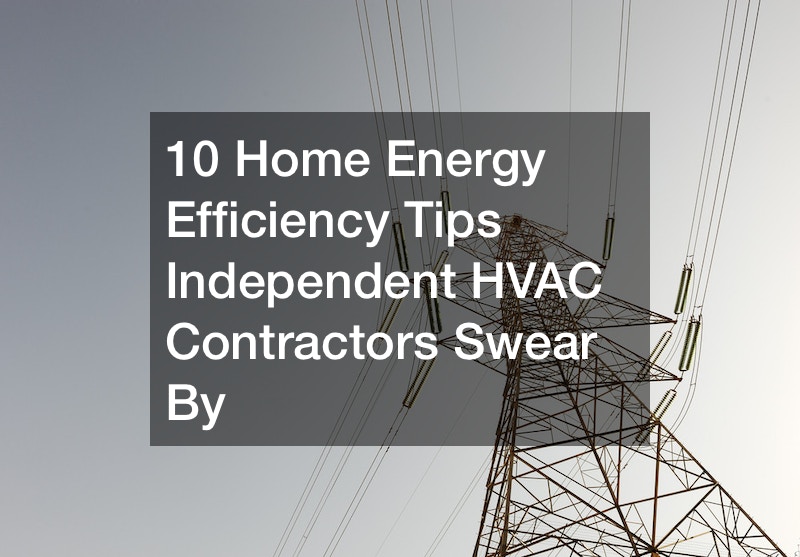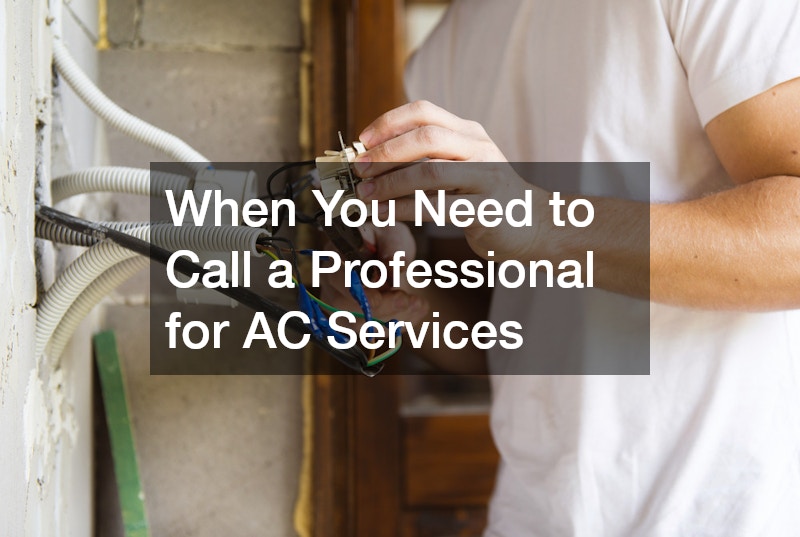Homeowners are increasingly concerned about energy efficiency. As such, they are regularly seeking ways to limit their energy consumption. A positive by-product of less consumption is lower utility bills. Independent HVAC contractors hold a wealth of knowledge when it comes to maximizing home energy efficiency. We take a peek into the top 10 home energy efficiency tips that these professionals swear by.
1. HVAC Maintenance Is Always Better Than Repairs
Energy efficiency is not just about saving money. When you realize this efficiency, it helps your home remain comfortable all year. Independent HVAC contractors are well-versed in the intricacies. This perfectly positions them to provide invaluable insights on how to optimize your home’s energy usage. One of the cardinal rules emphasized by independent HVAC contractors is the importance of regular HVAC maintenance.
AC repairs can be costly and disruptive, not to mention uncomfortable during extreme weather. By investing in routine maintenance, you can identify and address issues before they escalate into major repairs. You are saving yourself from frustration and a large expense. Proper maintenance includes cleaning or replacing air filters. This process ensures that the ventilation system is functioning correctly. The result of this is improved indoor air quality. Your family has a reduced risk of respiratory issues and allergies.
The refrigerant levels are checked, and all moving parts are lubricated. At this time, the electrical connections are inspected. These quick steps can ensure your HVAC system runs efficiently. An efficient HVAC system reduces energy consumption and extends its lifespan. HVAC systems that receive consistent maintenance tend to have longer lifespans. Components are less likely to wear out prematurely when well-maintained.
2. Professional Work Always Beats Out DIY Work
While DIY projects can be satisfying, some aspects of HVAC maintenance and repair should be left to professionals. Independent HVAC contractors are trained and certified to handle intricate HVAC systems. Attempting to fix complex HVAC issues without the necessary knowledge and tools can lead to costly mistakes. An improperly repaired or installed air conditioning unit may pose safety risks. Always consult an experienced air conditioning contractor for tasks beyond routine maintenance.
Professionals have functional knowledge and expertise in their fields. They have often participated in extensive training and bring a wealth of hands-on experience. With this expertise they can tackle complex tasks efficiently and effectively. They are known for delivering higher-quality work. In contrast, DIYers may lack the skills and knowledge to achieve the same level of quality.
Many projects are subject to building codes, regulations, and permits. Professionals are well-versed in these requirements and ensure that work complies with all applicable laws. Non-compliance can lead to legal issues and costly corrections. A professional contractor works more efficiently and quickly due to their experience and proficiency. They can complete tasks in a fraction of the time it might take an inexperienced DIYer. This efficiency can be particularly valuable when time is short. Think about how sensitive it is when you need emergency repairs or time-sensitive projects.

3. Choose Your Local HVAC Company Wisely
You don’t want to forget about the right air conditioning company when selecting HVAC services. Independent HVAC contractors recommend researching local companies with a solid reputation for quality work and customer satisfaction. A reputable company will have certified technicians. You can expect transparent pricing and prompt service. Choosing a trusted HVAC company ensures that your system is in capable hands. This promises you a minimized risk of unexpected issues and maximizing energy efficiency.
Local HVAC companies are geographically closer to your residence or business. This results in a quicker response time to HVAC emergencies. A local company has a deep understanding of the local climate and environmental conditions. They know the specific challenges that homeowners or businesses in your area face. This could include extreme weather and humidity. This knowledge allows them to recommend and implement solutions geared to your region’s needs.
A local air conditioning company is often deeply rooted in their communities. They rely on their reputation and referrals to build their businesses. This means they are motivated to provide excellent service. They work tirelessly to maintain a positive image within the community. HVAC systems follow local building codes and regulations. A local business is well-versed in these requirements, ensuring that installations and repairs comply with all relevant laws.
4. Get Your Furnace Checked Well Before the First Frost
As winter approaches, it’s essential to get your furnace checked by an independent HVAC contractor well before the first frost. Furnace repair during peak winter months can be costly and inconvenient. It’s advisable to schedule a maintenance check in advance. These checks ensure your furnace operates efficiently and safely throughout the heating season. Furnaces may sit dormant during the warmer months, and issues can develop over time.
Having your furnace checked early ensures that it operates properly when you need it most. It allows any problems to be identified and addressed before they become critical. The last thing you want is for your furnace to break down on the coldest day of the year. Scheduling a furnace check in advance helps prevent such emergencies. Furnaces can accumulate dust and debris that compromise safety.
Furnace technicians will inspect your unit for any potential safety hazards. Correct measures are taken if gas or carbon monoxide leaks are detected. Regular furnace maintenance includes cleaning burners and inspecting the heat exchanger. A technician also tests the safety controls. An efficient furnace not only reduces energy consumption but also prevents potentially hazardous situations. Many furnace warranties require regular professional maintenance to remain valid. Failing to schedule regular checks may result in voiding your warranty, leaving you responsible for the full cost of repairs or replacements.

5. Have a Backup Plan for Emergency Heat
Independent HVAC contractors often recommend having a backup plan for emergency heat. In regions prone to extreme cold or power outages, alternative heating sources can be lifesavers. Direct-fired heaters use propane or natural gas and do not rely on electricity to function. Having these backup heating options ensures your home remains warm and comfortable. Your house remains warm even in extreme conditions while also safeguarding against high utility bills.
Severe weather events such as winter storms or hurricanes are often the cause of power outages. When your primary heating system relies on electricity, a power outage can leave you without heat. If temperatures plummet, your safety could be at risk. Having an alternative heat source ensures you can maintain a comfortable temperature in your home. You are able to avoid cold-related health issues.
In cold weather, water pipes can freeze and burst if they are not properly insulated or heated. Using an emergency heat source can help prevent this by keeping the interior temperature above freezing. This can save you from costly water damage and plumbing repairs. Cold temperatures can damage sensitive items in your home, such as electronics and artwork. An emergency heat source helps maintain a stable and suitable temperature to protect these valuables from damage.
6. Choose Your Heating Energy Source With Care
When selecting an energy source for your home, you want one that positively impacts efficiency and cost. Independent HVAC contractors advise homeowners to carefully consider their options. This includes fuel oil, natural gas, or electricity. Some sources, like natural gas or geothermal heating, are highly efficient. These sources convert a large portion of the energy into heat. Electric heating, on the other hand, may be less efficient. Choosing an energy-efficient source can lead to a decrease in energy bills. The best choice also reduces your environmental impact.
Each energy source has positive features associated. Your choice should consider your specific needs and circumstances. An HVAC expert consultation helps you make an informed decision that balances efficiency and affordability. The cost of energy sources can fluctuate based on key factors. They can include regional availability and market demand. With balance for current and long-term cost implications, you can select the best energy source.
Some energy sources are more locally sourced and offer greater energy independence. For example, solar panels or geothermal systems allow you to generate heat on-site. This reduces your reliance on external energy suppliers while enhancing energy security.

7. Keep Plenty of Heating Fuel on Hand
If your home relies on heating fuel, maintain an adequate supply. Running out of heating fuel in the midst of winter can be a disaster. Independent HVAC contractors recommend having a propane storage tank or fuel oil tank that is regularly filled before it runs low. This ensures a continuous supply of heating fuel. It also prevents the need for emergency deliveries at a premium.
Running out of heating fuel in the middle of cold weather can be a significant inconvenience and sometimes a safety concern. It can lead to freezing indoor temperatures, which can damage pipes and appliances. Having a sufficient supply of heating fuel is part of being prepared for emergencies.
During severe weather events, such as winter storms, access to fuel may be limited. Having a stockpile on hand ensures you can continue to heat your home and stay safe during such situations. Heating fuel prices can fluctuate throughout the year, and they often rise during peak demand in the winter months. By purchasing and storing fuel when prices are lower, you can save money. Fuel typically has periods when it spikes due to high-demand periods.
8. Store Your Heating Fuel Safely
Safety is paramount when dealing with heating fuel. Proper storage of fuel oil or propane is essential to prevent accidents. In addition, it can ensure the fuel’s quality. Independent HVAC contractors stress the importance of adhering to safety guidelines. They also remain current on regulations.
Safety includes having secure and well-maintained fuel tanks. You should also check for leaks or damage. You also want to store fuel away from potential sources of ignition. Ensuring the safe storage of heating fuel reduces the risk of accidents. It also contributes to energy efficiency and cost savings. Heating fuels, such as propane and wood pellets, are flammable and potentially hazardous materials. Storing them safely reduces the risk of fires and explosions.
Accidental spills or leaks of heating fuel can harm the environment. This ends up contaminating soil and groundwater. Safe storage practices help prevent environmental pollution and the associated legal and cleanup costs. Many areas have regulations and codes governing the storage of heating fuels. Compliance with these regulations is essential to avoid legal issues or penalties. Proper storage ensures that you meet these requirements.

9. A Whole HVAC System Overhaul Can Save You Money in the Long Run
While it may seem like a significant investment upfront, independent HVAC contractors often advise homeowners to consider a whole system overhaul. This is especially true if their existing system is outdated or inefficient. Upgrading to a modern HVAC system can result in substantial long-term savings on energy bills.
Additionally, many energy-efficient systems qualify for rebates and incentives. You can also consider financing options like a loan from credit union to spread the cost over time. New HVAC systems are often more reliable and require less frequent maintenance and repairs. This means you’ll spend less money on servicing and repairs. This contributes to overall cost savings.
10. Don’t Neglect Home Insulation and Draft Blocking
Independent HVAC contractors recognize the critical role of proper insulation and draft blocking. Inadequate insulation or drafty areas can lead to heat loss in the winter and increased cooling demands in the summer. This drives higher energy consumption and increased utility bills.
Invest in insulation upgrades and sealing spaces to create a more airtight and thermally efficient home. Another consideration is the installation of an energy-efficient window treatment. The result is enhanced comfort and reduced stress on your HVAC system.
Adequate insulation and draft blocking help reduce the workload on your HVAC system. From this, you’ll see lower heating and cooling costs. Proper insulation and draft blocking create a more comfortable living environment. You’ll experience fewer temperature fluctuations and cold spots. You can eliminate drafts and lead to a cozier home.
Independent HVAC contractors possess a wealth of knowledge. They focus this expertise on optimizing home energy efficiency. From regular HVAC maintenance to choosing the right professionals, these strategies work. They offer a complete approach to a more energy-efficient home. These techniques save money while contributing to a more sustainable future.



